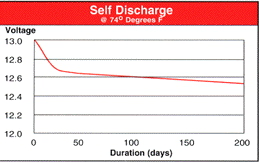Hi RonR,
I do not believe there is an easy, accurate method of measuring battery State of Health (SOH) while your batteries are installed and cabled in your boat. There is some hope that the Balmar SG200 battery monitor can "learn" your boat's SOH, with (in my opinion, not yet definitively proven) accuracy. There are various "battery meters" on the market, ranging from a few dollars to a few hundred dollars. In my opinion, they're worthless. Short of rousting out your batteries and either performing a lab-quality 20-hour discharge test at home, or maybe testing them with a variable-resistance load tester at a shoreside battery retailer, I'm at a loss for help.
Rod Collins at Marine How To (
https://marinehowto.com/) has about the most comprehensive set of discussions of this topic I'm aware of, so for more detailed information, I strongly suggest you visit his web site. And contribute $$ if you can-he's a valuable asset to the boating community. And while I'm not a Nigel Calder fan, he has much to contribute as well.
Personally, I monitor both my start and house batteries' State of Charge (SOC) and voltage via a Victron battery monitor, and try and develop a sense of how much my SOC has degraded, and what my battery voltage should be, after staying overnight off of shore power. If I feel my SOC is low for my usage overnight, I start to get goosey regarding my SOH. And as I've never had a battery fail gracefully (in my experience, they're here today, gone tomorrow), I probably buy more batteries than I should.
But I've never had to paddle home, either.
Regards,
Pete
ps-sorry there's no definitive qualitative answer to your question. An honest answer is "it depends".




